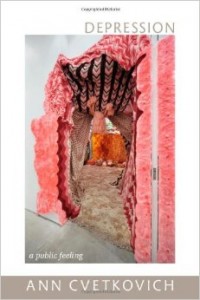 Depression: A Public Feeling
Depression: A Public Feeling
by Ann Cvetkovich
Duke University Press. 296 pages, $23.95
IN Depression: A Public Feeling, Ann Cvetkovich attempts to find different ways of writing and thinking about depression. The book is divided into two parts. The first part, “The Depression Journals (A Memoir),” describes her own experiences of depression while doing her dissertation, writing her first book, and dealing with feelings of political despair. In the second part, “A Public Feelings Project (A Speculative Essay),” she takes insights gained while coping with her own experience to develop three essays about depression as a subject for critical analysis. “This book began from a simple premise,” she states: “that depression should be viewed as a social and cultural phenomenon, not a medical or biological one.”







